简体中文
繁體中文
English
Pусский
日本語
ภาษาไทย
Tiếng Việt
Bahasa Indonesia
Español
हिन्दी
Filippiiniläinen
Français
Deutsch
Português
Türkçe
한국어
العربية
PH SEC Warns Against Binance for Unauthorized Operations
Abstract:Philippines SEC issues advisory against Binance for unauthorized operations, ensuring investor protection and compliance with local regulations.
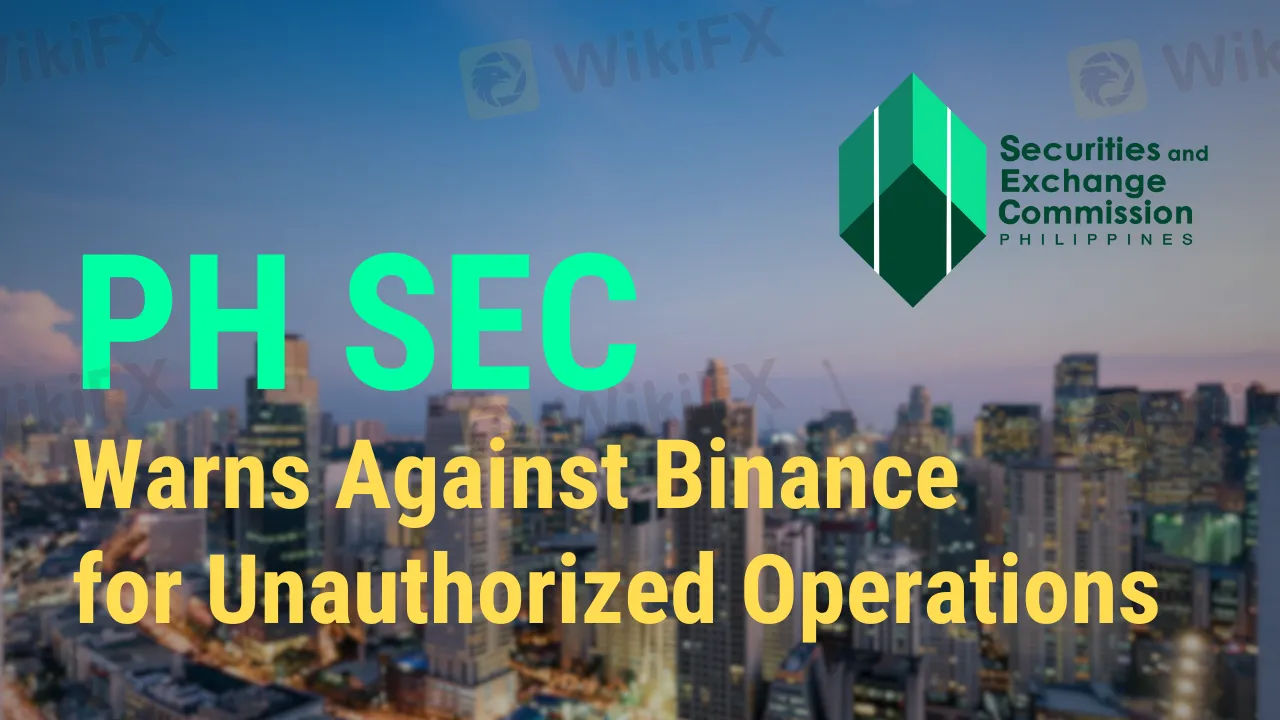
MANILA, PHILIPPINES (AP) — The Securities and Exchange Commission (SEC) of the Philippines has issued a recommendation against Binance, a large global cryptocurrency exchange, in a significant regulatory action. This judgment demonstrates the SEC's commitment to ensuring that all financial exchanges in the nation comply with local laws and regulations.
SEC's Actions Against Unauthorized Activities
The Philippines SEC has taken a firm stance against unauthorized financial activities, particularly focusing on cryptocurrency exchanges like Binance. The Commission has clarified that Binance is not authorized to offer or sell securities in the Philippines. Despite its status as a registered broker/dealer overseas, Binance must adhere to the Philippines' specific regulations under the Securities Regulation Code (SRC). These include registering securities with the SEC, operating as a registered corporation or licensed dealer in the Philippines, and possessing a secondary license for public offerings.

Comprehensive Strategy to Block Unauthorized Access
Following the advisory, the SEC plans to work closely with the National Telecommunication Commission (NTC) and the Department of Information and Communications Technology to block access to Binance within the Philippines. This action aims to prevent Filipino users from accessing the website and its applications. Furthermore, the SEC has requested major tech companies like Google and Meta to prohibit online advertisements from Binance from appearing to users in the Philippines.

Acknowledging the impact on Filipino investors, the SEC has indicated a three-month transition period following the advisory issuance. This period allows Filipino investors with holdings in Binance to close their positions and withdraw their investments, ensuring a smoother transition away from the platform.
Crackdown on Unlicensed Exchanges
This development is part of a broader initiative by the SEC to name and crack down on unlicensed exchanges. The Commission's proactive approach aims to protect the public from potentially harmful and unregulated financial activities, particularly in the burgeoning field of cryptocurrency trading.
The SEC has detailed the requirements for compliance under the Securities Regulation Code. These include the need for securities to be registered with the SEC, the issuance of securities by a registered corporation or licensed dealer in the Philippines, and the possession of a secondary license for public offerings.
Public Advisory
The SEC has issued a public advisory, cautioning Filipinos against engaging in investment and trading activities using Binance's platforms. The advisory highlights that Binance has been actively promoting its services on various social media platforms to attract Filipino users.


Binance claims to operate a facility for trading financial instruments and offers various investment products, including spot trading with leverage, futures contracts, option contracts, cryptocurrency savings accounts, staking services, and a platform for initial coin offerings. However, in the Philippines, such activities require compliance with specific regulations which Binance has yet to fulfill.
SEC's Database and Registration Status
According to the SEC's database, Binance is not registered as a company in the Philippines and operates without the appropriate license and/or permission to sell or issue securities. This involves buying or selling securities, acting as a broker or dealer, and forming or maintaining a securities exchange.
Conclusion
The SEC's advice against Binance underscores the SEC's commitment to the integrity of the Philippine financial market. The SEC's goal is to safeguard investors and ensure the stability of the country's financial ecosystem by enforcing rules and guaranteeing compliance. This action sends a strong message to all financial firms existing or proposing to operate in the Philippines: compliance with local rules and laws is non-negotiable.

Disclaimer:
The views in this article only represent the author's personal views, and do not constitute investment advice on this platform. This platform does not guarantee the accuracy, completeness and timeliness of the information in the article, and will not be liable for any loss caused by the use of or reliance on the information in the article.
Read more
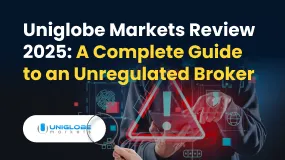
Uniglobe Markets Review 2025: A Complete Guide to an Unregulated Broker
Uniglobe Markets claims to be an online trading company that offers many different types of investments, including foreign currency and raw materials. The company tries to attract traders by offering high leverage, different account options, and popular MetaTrader trading software. However, there is one major problem: the company does not have proper regulatory oversight. This creates serious concerns about the safety of clients’ capital and whether the company operates honestly. Read on to learn more about its regulatory status.
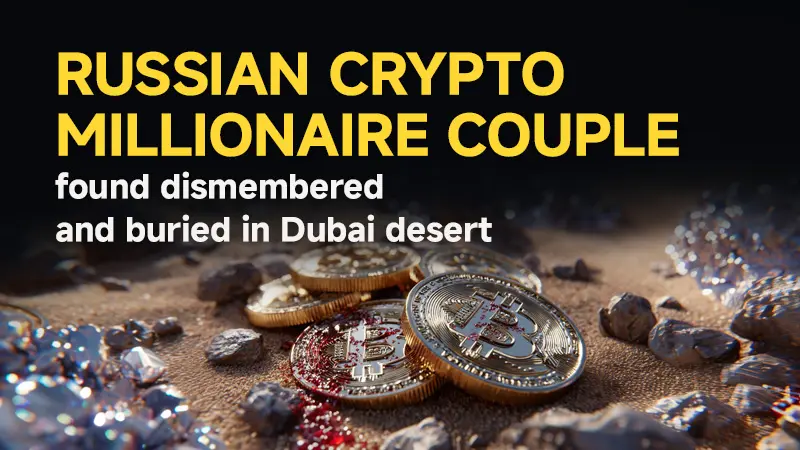
Russian crypto millionaire couple found dismembered and buried in Dubai desert
A gruesome case has emerged involving a Russian couple living in the United Arab Emirates who went missing in early October and whose remains were recently discovered in a desert near Dubai. Roman Novak, a self-styled cryptocurrency “millionaire”, and his wife Anna had last been seen travelling to a supposed investor meeting in the UAE, but according to investigators were instead abducted and murdered after a ransom plot failed.
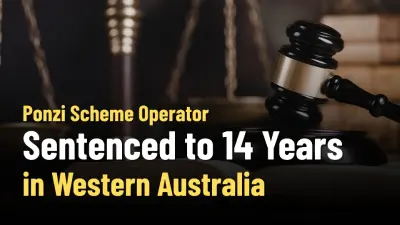
Ponzi Scheme Operator Sentenced to 14 Years in Western Australia
Chris Marco, a Ponzi scheme operator, was sentenced to 14 years for a $34 million investment fraud in Western Australia. Read about the case and its impact.
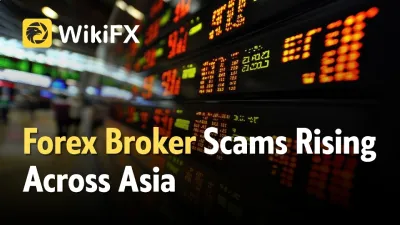
Forex Broker Scams Surge Across Asia’s Trading Markets
Investment scams tied to fake forex brokers and crypto exchanges are rising in Asia, exploiting weak KYC rules and targeting cross-border investors.
WikiFX Broker
Latest News
2 Malaysians Arrested in $1 Million Gold Scam Impersonating Singapore Officials
Exness Broker Expands in South Africa with Cape Town Hub
Fraud Mastermind Zhimin Qian Sentenced to 11 Years for $6.6 Billion Bitcoin Ponzi Scheme
Is FXPesa Regulated? Real User Reviews & Regulation Check
Almahfaza Broker – 2025 Review: Safe or Scam?
Uniglobe Markets Review 2025: A Complete Guide to an Unregulated Broker
INZO Broker No Deposit Bonus: A 2025 Deep Dive into Its Offers and Risks
Global Guide to Finding Forex IBs/Brokers — Share Your Pick and Win Big!
Consob Targets Political Deepfake “Clone Sites” and Unlicensed Platforms in Latest Enforcement Round
WikiEXPO Global Expert Interviews: Gustavo Antonio Montero: ESG in Finance
Currency Calculator



